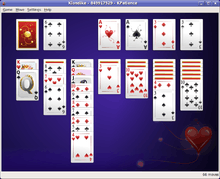Solitaire
Solitaire is any tabletop game which one can play by oneself, usually with cards. The term "solitaire" is also used for single-player games of concentration and skill using a set layout tiles, pegs or stones. These games include peg solitaire and mahjong solitaire. Most solitaire games function as a puzzle which, due to a different starting position, may (or may not) be solved in a different fashion each time.
| Look up solitaire in Wiktionary, the free dictionary. |

History
The origin of Solitaire is up for dispute. The term Patiencespiel appears in Das neue Königliche L’Hombre-Spiel, a German book published in 1798. Books were also reported to appear in Sweden and Russia in the early 1800s. There are additional references to Solitaire in French literature. [1] In the United States, the first solitaire book, Patience: A series of thirty games with cards, was published by Ednah Cheney in 1870. [2]
Rules
Klondike Solitaire uses a standard deck. A deck of card has four suits, Spades, Clubs, Diamonds, and Hearts. Each suit is ranked 1 to 13. The cards are shuffled and dealt into stacks. The first stack has one card and each subsequent stack has one more card than the one before it. Only the last card of each stack is faced upward such that it is visible to the player. The goal is to sort the cards into suit stacks in ascending order. [3]
Types of games
- Patience or card solitaire, also known as "solitaire with cards", generally involves placing cards in a layout, and sorting them according to specific rules.[4] The most common variant is Klondike, which is included with the Windows operating system under the title Solitaire.
- Mahjong solitaire is a single-player matching game that uses a set of mahjong tiles rather than playing cards. It is more commonly played on a computer, than as a physical tabletop game.
- Peg solitaire (more of a puzzle than a game, since, once it is solved, it is repeatable)
- Concentration also known as memory, Pelmanism, shinkei-suijaku, pexeso or simply pairs, a card game in which all of the cards are laid face down on a surface and two cards are flipped face up over each turn. The object of the game is to turn over pairs of matching cards.
External links
- David Parlett. Historic Card Games: Patience playing-card solitaires
References
- Morehead, Albert (May 6, 2015). The Complete Book of Solitaire and Patience Games. Read Books Ltd. Retrieved August 6, 2020.CS1 maint: date and year (link)
- "History of Solitaire". Solitaired.
- Yan, X., Diaconis, P., Rusmevichientong, P., & Roy, B. V. (2005). Solitaire: Man versus machine. In Advances in Neural Information Processing Systems (pp. 1553-1560).
- "What You Should Know About Solitaire Card Games". 16 June 2020. Retrieved 31 July 2020.
| Wikibooks has a book on the topic of: Solitaire card games |
